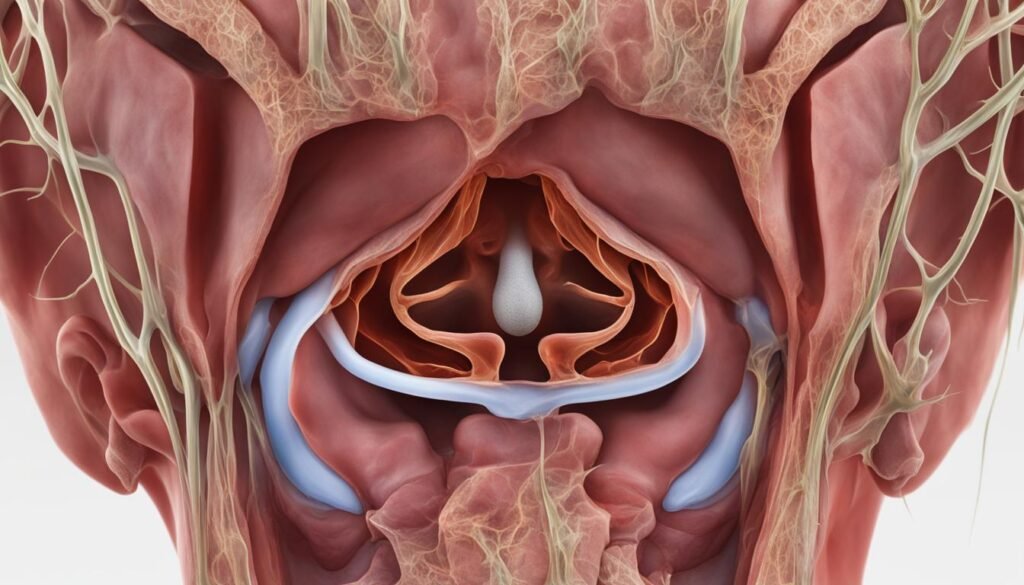Can sinus pressure cause hearing loss? Sinusitis, a prevalent condition, is known for symptoms like nasal congestion, facial pain, and post-nasal drip, but its impact on hearing is often overlooked. This section will explore the connection between sinusitis and hearing loss, focusing on the causes, symptoms, and how sinus pressure can affect your hearing.
Key Takeaways:
- Sinusitis can lead to symptoms like nasal congestion, facial pain, and post-nasal drip.
- It is important to recognize the symptoms of sinusitis to seek appropriate treatment.
- Sinusitis can cause ear pain and jaw discomfort due to the connection between the sinuses and the ears through the Eustachian tube.
- While sinusitis is generally not associated with permanent hearing loss, it can lead to temporary hearing loss in rare cases.
- If you experience ear pain from a sinus infection, remedies like warm compresses, pain relievers, and saline nasal sprays can provide relief.
Causes and Symptoms of Sinusitis
Sinusitis is a common condition that can have various causes. It usually occurs due to bacterial, fungal, or viral infections. Allergies and lengthy colds can also contribute to the development of sinusitis. These factors can lead to inflammation and blockage of the sinuses, resulting in the symptoms associated with the condition.
The main symptoms of sinusitis include nasal congestion, facial pain and pressure, headache, and post-nasal drip. Nasal congestion occurs when the sinuses become swollen, and mucus cannot drain properly. This congestion can lead to a feeling of pressure in the face, particularly around the forehead, eyes, and cheeks. Headaches may also occur as a result of the increased pressure in the sinuses. Additionally, post-nasal drip involves the excessive production of mucus that drips down the back of the throat, leading to a sore throat or cough.
Uncover the facts about whether can hearing loss cause brain fog
Recognizing these symptoms is crucial to seek appropriate treatment for sinusitis. Early intervention can help alleviate discomfort and prevent the condition from worsening. If you experience any of these symptoms, it is advisable to consult a healthcare professional for a proper diagnosis and personalized treatment plan.
Connection Between Sinusitis and Ear Pain
Sinusitis can often cause uncomfortable symptoms, including ear pain and jaw pain. This is because the sinuses and the ears are connected through a small canal called the Eustachian tube. When the sinuses become inflamed and blocked, the Eustachian tube can also become blocked, leading to a buildup of pressure in the ear. This pressure can result in earache and discomfort.
The symptoms of sinusitis-related ear pain can vary. Some people may experience a dull, aching sensation or a feeling of fullness in the ear. Others may notice sharp, shooting pains or a throbbing sensation. In addition to ear pain, sinusitis can cause jaw pain and headache, further adding to the discomfort.
If you are experiencing sinusitis-related ear pain, it is vital to seek medical attention to receive an accurate diagnosis and appropriate treatment. Your healthcare provider may recommend over-the-counter pain relievers to help alleviate the discomfort. They may also suggest using a warm compress on the affected ear to reduce inflammation and promote comfort. Nasal decongestants or saline sprays may be recommended to help clear the sinuses and relieve pressure.
It is important to note that while sinusitis can cause ear pain and discomfort, it is generally not associated with long-term or permanent hearing loss. However, if you are concerned about your hearing or if your symptoms worsen or do not improve with at-home remedies, it is important to follow up with a healthcare professional for further evaluation and guidance.
Can Sinusitis Cause Hearing Loss?
Sinusitis is a common condition that can cause various symptoms, including nasal congestion, facial pain, and post-nasal drip. Many individuals who suffer from sinusitis may also experience ear pain and a feeling of fullness in the ear. But can sinusitis lead to hearing loss? Let’s explore this topic in more detail.
While sinusitis can cause ear discomfort, it is generally not associated with permanent hearing loss. However, in rare cases, sinusitis can lead to a condition known as otitis media, which is an infection of the middle ear. Otitis media can result in temporary hearing loss due to fluid accumulation in the middle ear. It is important to note that this hearing loss usually resolves once the infection has been treated and the fluid has been drained.
“While sinusitis can cause discomfort in the ears, it is generally not associated with permanent hearing loss.”
It’s essential to seek medical care if you are experiencing symptoms of sinusitis, including ear pain, as timely treatment can help alleviate the symptoms and prevent any complications. Your healthcare professional will be able to diagnose your condition and recommend appropriate treatment options accurately. In most cases, managing the symptoms of sinusitis, such as using warm compresses, taking over-the-counter pain relievers, and using saline nasal sprays, can help alleviate ear pain and promote healing.
Preventing Sinusitis-related Hearing Loss
While sinusitis-related hearing loss is rare, there are steps you can take to prevent the condition from worsening or recurring. First, it is essential to practice good sinus hygiene by keeping the nasal passages clean and moisturized. This can be achieved by using saline nasal rinses or sprays. Additionally, avoiding exposure to irritants such as cigarette smoke and allergens can help reduce the risk of sinusitis and its potential impact on hearing.
Sinusitis can cause ear discomfort but is generally not associated with permanent hearing loss. By seeking prompt medical care and practising good sinus hygiene, you can manage the symptoms of sinusitis and protect your hearing.

Managing Ear Pain from Sinus Infection
If you are experiencing ear pain due to a sinus infection, there are several remedies you can try to find relief. Here are some options:
- Using a warm compress: Applying a warm compress to the affected ear can help soothe pain and reduce inflammation. Soak a clean washcloth in warm water, wring out the excess moisture, and gently place it against the ear for 10-15 minutes. Repeat this several times a day for relief.
- Taking pain relievers: Over-the-counter pain relievers such as acetaminophen or ibuprofen can help reduce pain and inflammation associated with ear discomfort. Remember to follow the dosage instructions on the packaging and consult a healthcare professional if you have any concerns.
- Using saline nasal spray: Clearing your nasal passages with saline nasal spray can help alleviate congestion and relieve pressure in the sinuses. This may indirectly reduce ear pain caused by sinus infections. Follow the instructions on the saline nasal spray bottle for proper usage.
Staying hydrated when dealing with sinus infection-related ear pain is also essential. Drinking plenty of water and staying well-hydrated can help thin mucus and reduce congestion, which may contribute to ear discomfort. Remember to consult with a healthcare professional for personalized advice and treatment options.

Expert Tip:
“When using a warm compress, make sure the temperature is comfortable and not too hot. Applying excessive heat can damage the delicate tissues in the ear and worsen the pain. Be gentle and cautious when dealing with ear pain from sinus infection.”
Conclusion
Sinusitis is a common condition that can cause discomfort and various symptoms, including ear pain and a feeling of fullness in the ear. While sinusitis can be bothersome, it is important to note that it is generally not associated with long-term hearing loss.
If you are experiencing sinusitis symptoms, seeking medical care for an accurate diagnosis and appropriate treatment is crucial. By consulting with a healthcare professional, you can receive personalized advice and explore treatment options tailored to your specific needs.
Uncover the facts about whether HPV cause hearing loss
Managing sinusitis-related ear pain can often be achieved through conservative measures. Warm compresses can help soothe pain and reduce inflammation, while over-the-counter pain relievers can provide temporary relief. Additionally, saline nasal sprays can effectively clear mucus and relieve congestion, improving overall ear care.
Remember, sinusitis and its related symptoms can vary from person to person. Prioritizing your ear health and seeking professional guidance for proper sinusitis treatment and care is essential. Together with your healthcare provider, you can find the best approach to managing sinusitis and alleviating any associated ear discomfort.
Frequently Asked Questions
Can sinus pressure cause hearing loss?
While sinusitis can cause ear pain and a feeling of fullness in the ear, it is generally not associated with permanent hearing loss. However, in rare cases, sinusitis can lead to otitis media, an infection of the middle ear, which can cause temporary hearing loss. This usually resolves once the infection has been treated and the fluid accumulation in the middle ear is reduced.
What are the causes of sinusitis?
Sinusitis, the inflammation of the sinuses, is often caused by bacterial, viral, or fungal infections. Allergies also contribute by causing persistent inflammation, while prolonged colds can lead to infection and exacerbate sinusitis symptoms.
What are the symptoms of sinusitis?
The main symptoms of sinusitis include nasal congestion, facial pain and pressure, headache, and post-nasal drip.
How is sinusitis connected to ear pain?
Sinusitis can cause earache and jaw pain due to the connection between the sinuses and the ears through the Eustachian tube. When the sinuses become inflamed and blocked, the Eustachian tube may also become blocked, leading to a buildup of pressure in the ear.
Can sinusitis cause permanent hearing loss?
Sinusitis is generally not associated with permanent hearing loss. However, in rare cases, it can lead to temporary hearing loss if it develops into otitis media. This is typically resolved with appropriate treatment.
How can I manage ear pain from a sinus infection?
If you are experiencing ear pain due to a sinus infection, you can try using a warm compress to soothe the pain and reduce inflammation. Over-the-counter pain relievers can also help to reduce pain and inflammation. Additionally, saline nasal spray can help clear mucus and relieve congestion. Staying hydrated can also help to thin mucus and reduce congestion.
What should I do if I have symptoms of sinusitis?
If you are experiencing sinusitis symptoms, seeking medical care to receive an accurate diagnosis and appropriate treatment is vital. Most cases of sinusitis-related ear pain can be managed with conservative measures such as warm compresses, pain relievers, and saline nasal sprays. However, consulting with a healthcare professional will provide personalized advice and treatment options.



